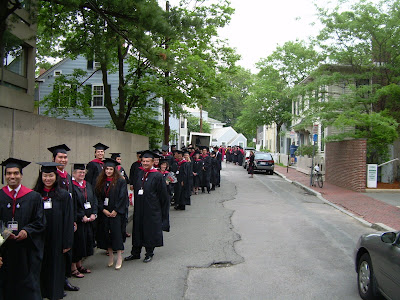Back in 2000 I worked as a student assistant at the Office of the Governing Boards, Loeb House. I had a very candid discussion with one of the Fellows regarding the Extension School and the school's status at Harvard. For the most part, the President & Fellows of Harvard College do feel that the degree programs at the Extension School are a strong component of Harvard's philosophical mission. Unlike most other Ivy League institutions, Harvard is the ONLY university to offer a true, world-class education to academically-enabled non-traditional, adult learners. While Columbia and Penn do have programs aimed at non-traditional students, the cost and slim evening course offerings are prohibitive to many working adults. According to this Fellow, the primary goal of the Corporation, as far as the Extension School is concerned, is to keep the programs affordable to adult students that may already be over-burdened with a variety of real-life expenses. The fundamental difference between Harvard College and the Harvard Extension School is NOT in the curriculum (as the ALB is heavily modeled after the traditional AB) but in the cost of attendance. If you compare the cost of attendance at Harvard College with the cost of attendance at the Harvard Extension School, you'll immediately notice a stark difference. That difference is of phenomenal benefit to the academically-enabled non-traditional student. We will earn a bachelor's degree from Harvard University, study with a world-class faculty, have access to a variety of resources (libraries, email accounts, facilities, many clubs/organizations etc.) and we will become alumni of Harvard University, just as anyone else graduating from the University.I don't agree with Chris' statement about the curriculum -- the Extension School can't match the sheer number or breadth of offerings available to College undergrads, and the Extension School does not have the core curriculum or many opportunities for specialization -- but his comments about the attitude of the Harvard Corporation toward the Extension School is interesting. The Corporation is a small but powerful group that makes many important decisions about University affairs, including choosing Harvard's president. I don't think the Extension School figures prominently in the Corporation's meetings, but if the governing body truly is dedicated to the Extension School's original mission of providing affordable access to non-traditional students, that's a good thing. The Extension School is a fabulous deal, providing access to world-class faculty and facilities at a relatively low cost, and it should stay that way.
However, one thing that the Corporation and the rest of the University needs to realize is the Extension School has outgrown its limited community and academic mission. For decades it was populated by casual students from neighboring cities and towns as well as a minuscule population of students interested in getting an associate of arts degree. While the casual population remains (see "The Extension School's 88% dilemma") there is now a significant contingent of undergraduate and graduate students attempting to complete the requirements for the ALB and ALM (graduate) degrees. Forget the outdated student profiles promoted in this 1951 Crimson article -- nowadays, the ALB/ALM student body includes many high achievers and people from all over the world interested in taking advantage of the school's stellar academic offerings. Extension School undergraduates sometimes match or outperform their College counterparts, and among my own graduating class for the ALM/liberal arts degree were a Harvard Divinity School graduate, a Harvard Medical School instructor, and students who had already earned JDs from two of the top law schools in the country before coming to the Extension School.
Chris touches on a few other points, including work/life/school balance, and his experiences in the Harvard clubs of Boston and New York. You can read the entire comment here (warning: Long, and no paragraph breaks!)
See also:
Thoughts on the ALB program: "The best undergraduate education possible"








